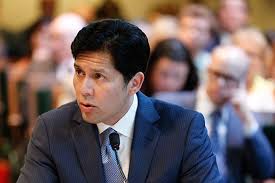Wednesday, February 28, 2018
Tuesday, February 27, 2018
Friday, February 23, 2018
Oppose the Janus Decision
As a union, we are, by nature, united. Our voice is stronger because we are together. We won’t let anyone silence our collective voice in advocating for safer, stronger schools and communities.
But that’s exactly what some greedy CEOs, special interests, and politicians are trying to do. With a Supreme Court case called Janus, they want to further rig the system so they can reap more profits — at the expense of the middle class. Their goal is to limit workers’ freedom to join strong unions — limiting the strength of our united voice. For educators, this means they want to stop you from having a voice to advocate for students and the resources they need to learn. This is a monumental moment in our nation’s history. The stakes are high for working people, and we need to make sure people are paying attention! The Supreme Court is hearing the Janus case next week and people across the country are coming together this Saturday, February 24, to show that we will not be silenced. In solidarity, The Education Votes Team Join the Working People's Day of Action. See post below. |
Koch Funded Attack on Teachers' Unions
The Koch brothers, the DeVos family and other wealthy, anti-union corporate interests will use the Supreme Court to try to take away your voice and your union.
Feb. 26 is when the Supreme Court case called Janus v. AFSCME is being heard. Through this case, these wealthy funders seek to defund and destabilize unions and make it harder for us to speak up for our students, patients, families and communities.
Strong unions mean stronger communities, and workers need and want strong unions. That’s why on Saturday, Feb. 24, we’re standing together for a Working People’s Day of Action.
Our union is our vehicle to fight for a better life for people, and, unfortunately, the funders of the Janus case see that as a threat to their power.
Sunday, February 18, 2018
Gun Violence in Schools
I spent yesterday in Broward County, Fla., simply trying to help.
I met with educators and school staff from Stoneman Douglas High School and so many other schools—union members from Broward Teachers Union who spent hours at our afternoon meeting. They are feeling and expressing every emotion possible right now.
Let’s take a moment to appreciate the Stoneman Douglas staff, who on 2/14 performed acts of selfless heroism to protect their kids from bullets, hiding them in closets and keeping them calm.
I met with educators who lost their colleagues and the students they loved.
I heard from students who sheltered in closets, who lost their friends, who wrote texts to their families thinking they had one last opportunity to say they loved them, and who are now speaking out and demanding action. As Emma Gonzalez said, “We are going to be the kids you read about in textbooks. Not because we're going to be another statistic about mass shooting in America, but because, just as David said, we are going to be the last mass shooting.”
Saturday, February 17, 2018
Thursday, February 15, 2018
Don’t be fooled by Trump’s immigration “plan”
Labels:
DACA,
immigration,
Trump
Kevin de Leon v Diane Feinstein
The above sloganeering is my response to an interview with me that was aired as part of a story on NPR’s Morning Edition yesterday. Last week, the redoubtable Ina Jaffe, intrepid NPR veteran, called me to talk about Dianne Feinstein. The reason she called was that I had written an L.A. Times op-ed some months back noting that Feinstein, at 84, is the oldest member of the Senate, and at the time was considering running for another six-year term, which, if she won, would mean she’d be 91.7 years old when that term expired. I noted that would get her in just under the actuarial wire, since the average life expectancy for 84-year-old women is 92. I ended the column by suggesting Feinstein not run—counsel she didn’t take all that seriously, since she declared her candidacy a few days later.
Ina’s piece was focused on the age issue. What I also said in the column and the interview, however, was age wasn’t the main reason why DiFi shouldn’t go one more round. The chief reason was that the California she’s accustomed to representing no longer exists. It’s a far more liberal state than the one Feinstein has long been navigating by positioning herself on the center-right of the Democratic Party.
Unlike most of California’s Democratic congressional delegation, for instance, Feinstein voted to authorize the Iraq War. She was among the small minority of Democratic senators to vote for George W. Bush’s tax cuts for the rich—and those Democrats who also voted for them came from red or purple states, which California, then as now, was not.
Fortunately, Feinstein isn’t going unchallenged. While she has no Republican opponents, the president of the California Senate, Los Angeles Democrat Kevin de Leon, is running against her from the left. One of the three organizers of the massive anti-Proposition 187 demonstration in 1994, which marked the birth of the modern immigrant movement, de Leon is arguably the most accomplished and most progressive state legislative leader in the country. He’s the author of California’s sanctuary state law, of most of its far-reaching climate-change legislation, and last year steered a single-payer bill to passage in the Senate.
The conventional wisdom is that Feinstein is a shoo-in, but just this week, some of the state’s most powerful liberal institutions come election time—SEIU, which has 700,000 members in California, and the California Nurses Association—endorsed de Leon. SEIU and CNA are longtime rivals that seldom agree on anything. That the two most potent political players in California Democratic elections have both come out for de Leon—risking the ire of ostensible shoo-in Feinstein—speaks volumes about where they think the state is headed, and should be headed. Maybe DiFi isn’t a shoo-in after all.
Labels:
de Leon,
Kevin de Leon,
U.S. Senate
Wednesday, February 14, 2018
How Unions Protect Help Immigrants Resist Deportations
HOW UNIONS HELP IMMIGRANTS RESIST DEPORTATIONS
By David Bacon
The American Prospect, February 13, 2018
https://davidbaconrealitycheck.blogspot.com/2018/02/how-unions-help-immigrants-resist.html
http://prospect.org/article/how-unions-help-immigrants-resist-deportations

In San Francisco janitors and other workers support AB 450, a bill to protect workers during immigration raids and enforcement actions.
Labor historian Fred Glass, looking at the impact of immigration on California's labor movement, notes that many immigrants have arrived in the state with a long history of labor and left-wing activism. Unions have then called on that history and consciousness to aid in organizing drives among janitors, farm workers, hotel housekeepers, and others. "Because the labor movement has understood this fact and designed its efforts around it," he argues, "California's unionization rate remains at 16 percent while the national average is 11 percent." The state has 2.55 million union members, far more than any other.
To union leaders, that's also one explanation-in addition to the state designating itself as a sanctuary-for the announcement by the Trump administration that it is targeting California for intensive workplace immigration enforcement. "It's obvious retaliation for California standing up for immigrants," charges Wei-Ling Huber, president of UNITE HERE Local 2850, the hotel union in the East and North San Francisco Bay Area. "Its purpose is to create a climate of fear among immigrant workers in general, and to attack the unions that have defended them."
Last fall the state legislature passed a series of bills intended to protect immigrants, especially immigrant workers. One bars police from asking about immigration status and from participating in immigration enforcement actions with federal agents. A second requires warrants before employers can give agents access to workplaces and records of workers' immigration status.
By David Bacon
The American Prospect, February 13, 2018
https://davidbaconrealitycheck.blogspot.com/2018/02/how-unions-help-immigrants-resist.html
http://prospect.org/article/how-unions-help-immigrants-resist-deportations

In San Francisco janitors and other workers support AB 450, a bill to protect workers during immigration raids and enforcement actions.
Labor historian Fred Glass, looking at the impact of immigration on California's labor movement, notes that many immigrants have arrived in the state with a long history of labor and left-wing activism. Unions have then called on that history and consciousness to aid in organizing drives among janitors, farm workers, hotel housekeepers, and others. "Because the labor movement has understood this fact and designed its efforts around it," he argues, "California's unionization rate remains at 16 percent while the national average is 11 percent." The state has 2.55 million union members, far more than any other.
To union leaders, that's also one explanation-in addition to the state designating itself as a sanctuary-for the announcement by the Trump administration that it is targeting California for intensive workplace immigration enforcement. "It's obvious retaliation for California standing up for immigrants," charges Wei-Ling Huber, president of UNITE HERE Local 2850, the hotel union in the East and North San Francisco Bay Area. "Its purpose is to create a climate of fear among immigrant workers in general, and to attack the unions that have defended them."
Last fall the state legislature passed a series of bills intended to protect immigrants, especially immigrant workers. One bars police from asking about immigration status and from participating in immigration enforcement actions with federal agents. A second requires warrants before employers can give agents access to workplaces and records of workers' immigration status.
Labels:
deportations,
resistance,
unions
Tuesday, February 13, 2018
250 + Organizations call for Sensible Immigration ...
antiracismdsa: 250 + Organizations call for Sensible Immigration ...: February 13, 2018 Dear Members of Congress: We, the undersigned immigration, refugee, faith, education, youth, healt...
Register Your Neighbors to Vote
Labels:
immigration,
register,
vote
Monday, February 12, 2018
Will We Ever Have as Much Money $$$$ as the Koch Brothers? | Portside
Will We Ever Have as Much Money $$$$ as the Koch Brothers? | Portside
Bill Fletcher on organizing.
Bill Fletcher on organizing.
Labels:
Bill Fletcher,
organizing
Sunday, February 11, 2018
'Trump, the Truth, and MS 13
|
When President Trump spoke during his State of the Union
address about tightening immigration laws to keep out members of MS-13, the
violent transnational street gang, many Angelenos working with former gang
members raised their eyebrows at one omission: MS-13 was formed in Central
Los Angeles, not Central America as the president suggested.
|
|
Jorja Leap, a University of California Los Angeles
anthropologist, lamented the common misconception that MS-13 was brought to
the United States from El Salvador. The group was in fact able to thrive in
the 1980s amid the intense poverty in Los Angeles.
|
|
MS-13, she said, took advantage of a social situation in which
young people had experienced abuse, trauma or social isolation in the United
States, not abroad. MS-13’s brand of violence then spread back to Central
America, exported by immigrants in the United States who were deported. Its
leadership, such as it is, is based in El Salvador and most of its members
are there.
|
|
“Any gang is opportunistic. They go where the population is
vulnerable,” Dr. Leap said, pointing out MS-13 has particularly terrorized
the immigrant community. “They stick to the communities where they can
intimidate, where they can abuse and blindside people.”
|
Subscribe to:
Posts (Atom)




